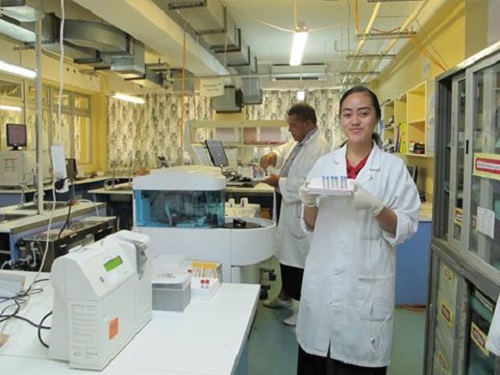
Paris, France | AFP |
Scientists said Monday they had found a suitable animal model for testing new Zika drugs — a monkey whose offspring suffers brain damage similar to human foetuses exposed to the virus.
One monkey, a pregnant pigtail macaque, was infected with Zika on day 119 of gestation — equivalent to about 28 weeks of a normal 40-week human pregnancy, a team of US-based researchers reported.
While the animal never developed symptoms, the brain of its foetus stopped growing — the first time this was observed in a lab animal, they wrote in the journal Nature Medicine.
“We were shocked when we saw the first MRI of the foetal brain 10 days after viral inoculation,” said paediatrics professor Lakshmi Rajagopal of the University of Washington (UW) in Seattle, who co-authored the study.
“We had not predicted that such a large area of the foetal brain would be damaged so quickly.”
The study also produced the first direct evidence of Zika virus crossing the placenta into the developing brain late in pregnancy, its authors said.
Zika is a virus spread mainly by mosquitoes, but in rare cases via sex.
In most people, including pregnant women, it is benign with mild or no symptoms.
But in an outbreak that started mid-2015, it has been linked to a form of severe brain damage called microcephaly which causes the heads of foetuses to be abnormally small, killing some and disabling others.
It likewise causes rare, adult-onset neurological problems such as Guillain-Barre Syndrome (GBS), which can result in paralysis and death.
More than 1.5 million people have been infected with Zika, mainly in Brazil, and more than 1,600 babies have been born with abnormally small heads and brains since last year, according to the World Health Organization (WHO).
There is no cure or vaccine for Zika, and a suitable animal model had been lacking for testing potential therapies.
Model monkey
Unlike mice, gestation in macaques closely resembles that of humans in many respects.
“This is the first animal model that is sufficiently close to human pregnancy that we can feel confident that a successful therapy will also work in humans,” co-author Kristina Adams Waldorf, also of UW, told AFP.
“This discovery is critical to accelerating research towards finding a vaccine or therapy that will completely prevent infection of the mother and also protect the foetus from foetal brain injury,” she said by email.
The speed at which the virus moved in on the foetus, said the authors, made it clear that prevention, not cure, was the way to go.
By the time a pregnant women becomes aware she is infected — if she notices at all — her baby’s brain may already be damaged.
In the macaque, the foetal brain stopped growing three weeks after infection, said the authors.
Had it survived, the foetus would have developed microcephaly in one more month.
“This is likely similar to the late-onset microcephaly that is being reported now in some infants in Brazil that are born with a normal head size, but then the head no longer grows and meets criteria for microcephaly after several months,” said Adams Waldorf.
Mosquitoes are spreading the virus in seventy countries and territories, mainly the Americas and Caribbean, according to the WHO. Twelve countries have reported sexual transmission.
Cases of microcephaly or other central nervous system malformations in babies have been recorded in 20 countries.
Tests with other macaques are ongoing, the researchers said, also at earlier stages of gestation.
 The Independent Uganda: You get the Truth we Pay the Price
The Independent Uganda: You get the Truth we Pay the Price


